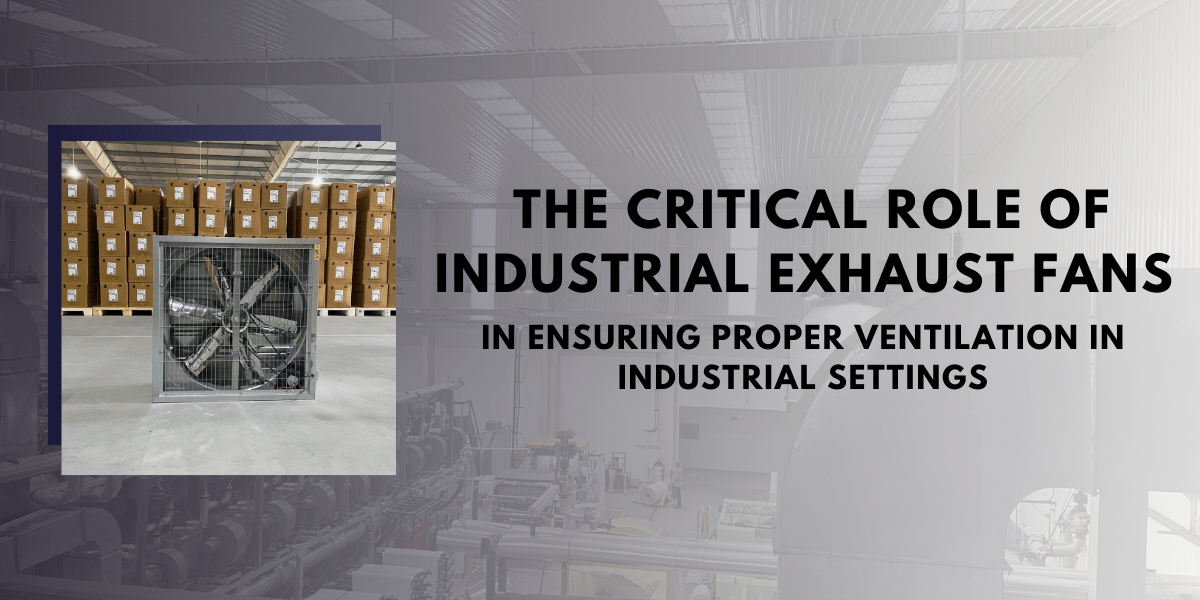In the industrial landscape, proper ventilation is not a luxury—it’s a necessity. It is a critical factor that influences not only the health and safety of employees but also the efficiency and longevity of equipment, the integrity of products, and the sustainability of the workplace environment. A vital component of an effective ventilation system is the industrial exhaust fan, a device designed to manage air quality by systematically replacing contaminated indoor air with fresh outdoor air. This article dives into why adequate ventilation is vital in industrial settings and how the use of industrial exhaust fans plays a pivotal role.
The Role of Ventilation in Industrial Environments
Ventilation is the circulatory system of any industrial facility. It ensures that stale, contaminated air is continuously replaced by fresh air, keeping the environment within safe and comfortable parameters. Without it, workers could be exposed to hazardous conditions, leading to health issues and decreased productivity, and processes could be negatively affected, potentially compromising product quality.
Health and Safety
Worker safety is paramount, and one of the most significant aspects of maintaining a safe industrial environment is ensuring clean, breathable air. Industrial processes can produce a variety of hazardous byproducts, such as dust, fumes, vapours, and gases, which can be detrimental to health if inhaled. Prolonged exposure to these pollutants can lead to respiratory problems, allergic reactions, and, in severe cases, chronic diseases or even cancer. Adequate ventilation, facilitated by an efficient industrial exhaust fan, removes these contaminants from the work area, drastically reducing the potential for health-related issues.
Compliance with Regulations
Occupational safety and health administrations worldwide have set stringent regulations for air quality in industrial workplaces. These regulations stipulate the maximum allowable concentrations of various pollutants. Failing to comply with these standards can result in fines, legal action, and reputational damage. Industrial exhaust fans help businesses meet these regulations by maintaining air quality and keeping the concentrations of hazardous substances below permissible exposure limits.
Product Integrity
In many industries, contaminants can compromise the quality of the products being manufactured. For example, in precision manufacturing, even a tiny amount of dust can result in defects that render a product useless. In the food industry, proper ventilation is necessary to prevent the growth of mould and bacteria. Industrial exhaust fans help to control the environment, ensuring that products meet quality standards.
Operational Efficiency
Poor ventilation can lead to a buildup of heat and humidity, which not only affects worker comfort but can also damage equipment and increase the risk of machinery failure. For instance, in data centres or facilities with sensitive electronics, excessive heat can lead to system malfunctions and costly downtime. By controlling temperature and humidity levels, industrial exhaust fans can enhance the operational lifespan of equipment and reduce maintenance costs.
Energy Efficiency and Environmental Impact
Modern industrial exhaust fans are designed with energy efficiency in mind. By optimizing airflow and reducing the need for air conditioning, these fans can significantly cut energy consumption. Furthermore, energy-efficient ventilation contributes to a facility’s environmental sustainability goals by lowering its carbon footprint—an increasingly important consideration for companies aiming to demonstrate corporate responsibility.
Critical Considerations for Effective Industrial Ventilation
To ensure adequate ventilation, several factors must be considered when implementing industrial exhaust fans:
- Fan Placement and Size: Fans must be strategically placed and sized correctly to handle the volume of air in the space adequately.
- Air Quality Monitoring: Constant monitoring is required to detect pollutant levels and adjust ventilation rates accordingly.
- Maintenance: Regular maintenance of exhaust fans is crucial to sustain performance and prevent unexpected breakdowns.
- Customization: Ventilation systems should be customized to the specific needs of the facility, considering the type of work done and the layout of the space.
Technological Advances in Industrial Exhaust Fans
The latest advancements in fan technology have led to the development of more intelligent, more adaptable ventilation systems. For instance, fans with variable speed controls can adjust airflow in real time based on air quality readings, thus maintaining optimal conditions. Additionally, integrating automation and IoT (Internet of Things) in industrial exhaust fans allows for remote monitoring and control, making it easier to manage the ventilation system efficiently.
Challenges and Solutions
Implementing proper ventilation in industrial settings has its challenges. The initial installation of industrial exhaust fans can be costly, and the energy required to run these systems can be significant. However, the long-term health benefits for employees, compliance with regulations, and operational savings generally outweigh the initial investments.
Moreover, technological innovations are continually making these systems more cost-effective and energy-efficient. For example, using solar-powered fans or incorporating heat recovery systems can mitigate energy consumption, offering a more sustainable solution.
Conclusion
Proper ventilation is a critical concern in industrial settings, essential for maintaining a healthy and safe work environment, ensuring compliance with health and safety regulations, and preserving the quality and integrity of products. Industrial exhaust fans are at the heart of effective ventilation systems, offering a robust and adaptable solution to the complex challenges of air quality management. Investing in the right ventilation technology not only protects workers and products but also boosts overall business efficiency and sustainability. As industries evolve and the emphasis on health and environmental compliance grows, the role of the industrial exhaust fan becomes ever more integral to industrial operations.

As the editor of the blog, She curate insightful content that sparks curiosity and fosters learning. With a passion for storytelling and a keen eye for detail, she strive to bring diverse perspectives and engaging narratives to readers, ensuring every piece informs, inspires, and enriches.










